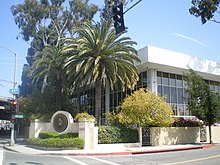Type a search term to find related articles by LIMS subject matter experts gathered from the most trusted and dynamic collaboration tools in the laboratory informatics industry.
National Academy of Recording Arts and Sciences | |
 Logo since 2018 | |
| Abbreviation | NARAS |
|---|---|
| Formation | 1957 |
| Type | Learned academy |
| Headquarters | Santa Monica, California, United States |
| Location |
|
CEO | Harvey Mason Jr. |
Key people | Panos Panay |
| Affiliations | The Latin Recording Academy MusiCares |
| Website | recordingacademy |
The Recording Academy (formally the National Academy of Recording Arts and Sciences; abbreviated NARAS) is an American learned academy of musicians, producers, recording engineers, and other musical professionals. It is widely known for its Grammy Awards, which recognize achievements in the music industry of songs and music which are popular worldwide. The Recording Academy is a founding partner of the Grammy Museum, a non-profit organization whose stated mission is preserving and educating about music history and significance. The Recording Academy also founded MusiCares, a charity with the stated goal of impacting the health and welfare of the music community. The Recording Academy's advocacy team lobbies for music creators' rights at the local, state, and federal levels.

The origin of the academy dates back to the beginning of the 1950s Hollywood Walk of Fame project. The Hollywood Chamber of Commerce asked the help of major recording industry executives in compiling a list of people in the music business who should be honored by Walk of Fame stars.[1][2] The music committee, made up of these executives, compiled a list, but as they worked, they realized there were many more talented industry people who would not qualify to be recognized with a Hollywood Boulevard bronze star.
The founding committee members included Jesse Kaye, MGM Records; Lloyd Dunn and Richard Jones, Capitol Records; Sonny Burke and Milt Gabler, Decca Records; Dennis Farnon, RCA Records; and Axel Stordahl, Paul Weston, and Doris Day from Columbia Records.[3] This was the start of the academy and also of the Grammy Awards.[4][5][6]
The Recording Academy was formally established in 1957.
The 1st Annual Grammy Awards was held simultaneously in two locations on May 4, 1959 – Beverly Hilton Hotel in Beverly Hills California, and Park Sheraton Hotel in New York City,[7] and 28 Grammys were awarded. The number of awards given grew and fluctuated over the years with categories added and removed, at one time reaching over 100.[8] The second Grammy Awards, also held in 1959, was the first ceremony to be televised,[9] but the ceremony was not aired live until the 13th Annual Grammy Awards in 1971.[10]
In 1997, the Recording Academy under Michael Greene launched The Latin Recording Academy, which produces the Latin Grammy Awards. Neil Portnow later served as president and CEO of the academy from 2002 to 2019.[11] Deborah Dugan was his replacement, taking over on August 1, 2019.[12] and is the first woman to lead the organization.[12] Dugan was removed from her position on January 16, 2020 after organizational claims of misconduct against her assistant, though she claimed she was ousted while experiencing conflicts in trying to reform the organization and other matters were revealed to her, including a sexual assault claim from an artist against Portnow.[13] Harvey Mason Jr. held interim president/CEO duties for the organization from 2020 to 2021.[14] He was named CEO in June 2021.
Since Mason's tenure, the Recording Academy has established the following initiatives:
In June 2021, the Recording Academy named Valeisha Butterfield Jones and Panos A. Panay as Co-Presidents, the first time the Academy has had multiple leaders in its history.[23]
In 2022, the academy endorsed the bipartisan Promoting Peace, Education, and Cultural Exchange (PEACE) Through Music Diplomacy Act.[24] In September 2023, it co-launched the Global Music Diplomacy Initiative in partnership with U.S. Secretary of State Antony Blinken at the State Department.[25][26]


The Grammy Awards are awards presented by the Recording Academy to recognize achievements in the music industry.[27]
According to the Recording Academy, the Producers and Engineers Wing (P&E Wing) is a part of the academy made up of producers, engineers, mixers, and other technically involved professionals.[28][29] The producers and engineers wing addresses various aspects of issues facing the recording profession. The P&E Wing also advocates for the use of professional usage of recording technology as well as the preservation of recordings.[citation needed]
The members of this division make up a large portion of those who vote on the Grammy Awards each year.[citation needed]
According to the Recording Academy, The Grammy University Network (Grammy U) is an organization for college students who are pursuing a career in the music industry. It offers forms of networking, interactive educational experiences and programs, advice from music professionals, and internship opportunities.[citation needed]
The Recording Academy supports the MusiCares Foundation, a philanthropic organization which provides money and services to musicians in an emergency or crisis.[citation needed]
The academy has twelve chapters in various locations throughout the United States. The twelve chapters are in Atlanta, Chicago, Florida, Los Angeles, Memphis, Nashville, New York City, the Pacific Northwest, Philadelphia, San Francisco, Texas, and Washington D.C.[30] Tammy Susan Hurt is the first LGBT Chapter President to have served on the board of the Atlanta Chapter since 2005.[31] The Washington branch organized the 2018 event Grammys on the Hill to coordinate passage of the Music Modernization Act in Congress.[30]